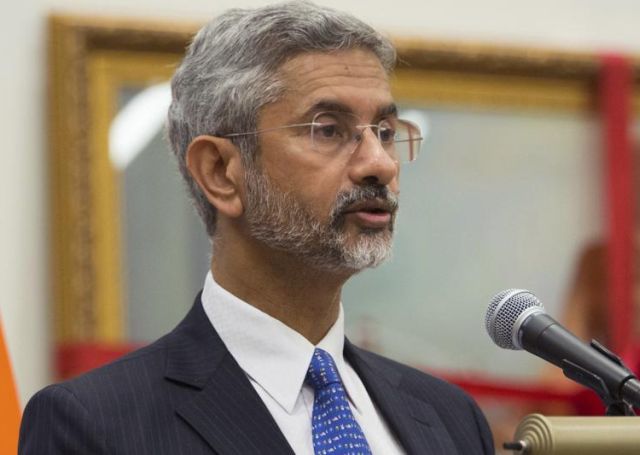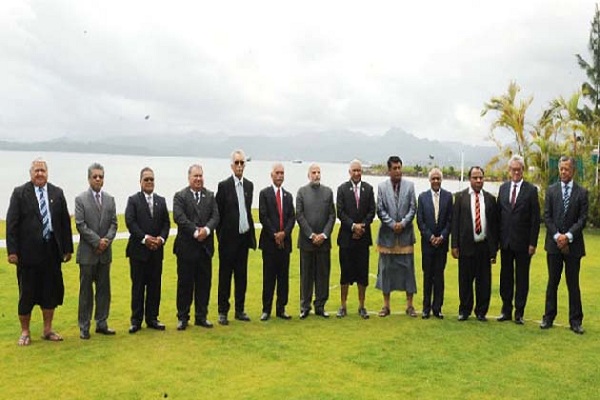
by Editor | May 25, 2021 | Business Summit, Events, World
 Bonn : This German city is hosting over 20,000 delegates and environmental activists of nearly 200 nations for the annual UN Climate Change Conference, Indian-origin Mayor Ashok Sridharan said.
Bonn : This German city is hosting over 20,000 delegates and environmental activists of nearly 200 nations for the annual UN Climate Change Conference, Indian-origin Mayor Ashok Sridharan said.
“We as Bonners are very proud to have the COP23 here and we want to be the good host for all the delegates coming from all over the world,” Sridharan said in a video tweet on Monday.
“We are expecting more than 20,000 people over here, which is a big challenge because we do have 320,000 inhabitants but all the people living in Bonn are very much looking forward to COP23,” he said.
Bonn was also the venue of UN Climate Change Conferences in 1999 and 2001.
The two-week climate change talks with the attendance of officials of 197 nations and thousands of non-state actors opened here on Monday with a commitment to go ahead of the 2015 Paris Agreement pledges to counter climate change.
In his inaugural remarks, Fiji President Frank Bainimarama, who is chairing the 23rd annual climate change talks of the parties or COP23, said there was a need to keep the climate action commitments in full and not back away from them.
COP23, coming just two years after the landmark adoption of the Paris Climate Change Agreement, will also further fuel momentum among cities, states, regions, territories, business and civil society in support of national climate action plans.
Close to 20 country leaders are expected to attend, including President Emmanuel Macron of France and German Chancellor Angela Merkel.
—IANS

by Editor | May 25, 2021 | Business Summit, Events, World

Japanese Prime Minister Shinzo Abe and Philippine President Rodrigo Duterte
Tokyo : Philippine President Rodrigo Duterte on Monday began his two-day state visit to Japan, to address the regional challenges ahead of the Summit of the Association of Southeast Asian Nations (Asean).
Duterte would meet Japanese Prime Minister Shinzo Abe and was expected to exchange views on North Korea’s nuclear and missile programs, the Japanese Ministry of Foreign Affairs said.
Before leaving for Japan, Duterte called for a dialogue with North Korea to curb the ongoing tension in the region, Efe news reported.
“It would be good for America, Japan, (South) Korea and Kim Jong-un to talk and convince him to sit down in a round table (and say) nobody is threatening him.
“There will be no war — and that no one is planning to destroy them,” Duterte said during a press conference in Davao, Philippines, before leaving.
The Japanese government noted that Duterte’s visit, the second since the beginning of his presidency in June 2016, is a good opportunity for the leaders to exchange views before the Asean Summit, which will take place in Manila in mid-November.
Before his meeting with Abe, Duterte would participate in a business event on Monday and meet Foreign Minister Taro Kono, as well as the President of the Japan International Cooperation Agency (JICA), Shinichi Kitaoka.
After holding a joint press conference with Abe, Duterte is set to attend a dinner hosted by the Prime Minister at his official residence.
On Tuesday, the Philippine President will be received by Emperor Akihito and Empress Michiko at the Imperial Palace, which will be his first meeting with the royal couple.
Duterte arrived in Japan early on Monday. His visit was shortened from three to two days due to the tropical storm Saola near Japan, which resulted in over fifty flights being cancelled on Sunday.
—IANS

by Editor | May 25, 2021 | Business Summit, Events, News, Politics

Foreign Secretary S. Jaishankar
New Delhi : Ahead of Japanese Prime Minister Shinzo Abe’s visit to India later this month for the annual bilateral summit, Foreign Secretary S. Jaishankar said that the future of India-Japan ties lies in nuclear and defence cooperation.
“Cooperation in civil nuclear energy and in defence are two domains that portend the future direction of our ties,” Jaishankar said while addressing the India-Japan Colloquium here.
“The difference that Japan can make to our nuclear industry can be quite substantive,” he said.
“Japan’s openness to supply India with military technology reflects the high level of confidence that the two countries have developed in each other.”
During Prime Minister Narendra Modi’s visit to Japan in November last year for the bilateral summit, the two sides signed an agreement on peaceful use of nuclear energy, among other accords.
In Modi’s earlier visit to Japan in 2014 for the annual summit, the bilateral partnership was upgraded to Special Strategic and Global Partnership.
Jaishankar said that “the growing convergence of views between Japan and India has the capacity to drive Asia’s economy and development and stimulate the global growth”.
“In this regard, the two countries have agreed to cooperate closely to promote connectivity, infrastructure and capacity-building in the regions that occupy the inter-linked waters of the Indo-Pacific,” he stated.
Stating that a broader modernisation of the Indian economy and society was very much in Japan’s larger interest, he said: “This would help create a more multi-polar Asia that, in turn, enables a more multi-polar world. From India’s perspective, as the first successful modernising example in Asia, Japan offers capabilities and practices that are particularly relevant to India at this juncture.”
According to the Foreign Secretary, Indian flagship development programmes such as Make in India, Digital India, Skill India and Startup India provide significant new opportunities for further collaboration between the businesses of India and Japan.
“There is immense potential for Japan’s technology, best practices and resources being harnessed to accelerate India’s growth,” he said.
“The enthusiasm of Japanese businesses is reflected in their growing presence in India and in the expansion of their activities.”
India-Japan bilateral trade in 2016-17 stood at $13.61 billion, a decrease of 6.21 per cent from 2015-16, when the figure was $14.51 billio.
As of October 2016, there were 1,305 Japanese companies operating in India, a growth of 6 per cent compared to 1,229 in October 2015.
Jaishankar also highlighted the role of Japan’s Official Development Assistance (ODA) in expediting the rapid modernisation of other Asian nations and said its relevance to constructing a more efficient infrastructure was particularly noteworthy.
“Japan is already working with India in priority infrastructure in India like the Western Dedicated Freight Corridor, the Delhi-Mumbai Industrial Corridor and various Metro rail projects,” he said.
“The Chennai-Bangalore Industrial Corridor is the next one on the horizon. The flagship project of our relationship, of course, is the Mumbai-Ahmedabad High Speed Railway.”
Jaishankar said that Prime Minister Abe’s forthcoming visit would demonstrate “concretely” that India and Japan were ready to move their relationship forward with determination.
—IANS

by Editor | May 25, 2021 | Business Summit, Events
 New Delhi:(IANS) India is to host the second edition of the Forum for India-Pacific Islands Cooperation (FIPIC) in Jaipur on August 21, with all 14 countries of the region participating — nine months after Prime Minister Narendra Modi on a visit to Fiji proposed holding of the second summit in India.
New Delhi:(IANS) India is to host the second edition of the Forum for India-Pacific Islands Cooperation (FIPIC) in Jaipur on August 21, with all 14 countries of the region participating — nine months after Prime Minister Narendra Modi on a visit to Fiji proposed holding of the second summit in India.
Of the 14 nations, three would be represented by their respective presidents, one by its vice president, seven island nations are sending their prime ministers, one its deputy prime minister and two are sending a senior minister to the meeting, sources told IANS.
India provides grant-in-aid of $200,000 to each country every year, an official source told IANS.
“The amount is enough for them, as they are not big countries.”
The meet will see India announce steps in which the countries lack expertise — cooperation in coconut and coir and solar energy, among other initiatives, the sources added.
India’s links with the Pacific Island nations, separated from India by 4,000 miles and two oceans, have been limited, compared to China’s expanding presence in the islands, situated to the east of Australia.
India does not have consulates on the islands, but is “covering them from five different countries — New Zealand, Japan, Philippines, Fiji and Papua New Guinea”, the sources added.
India’s first interactions with the Pacific Islands began in the 19th century when Indian indentured workers were brought to Fiji to work in the sugarcane plantations.
Modi, during his visit on November 19 last year, was the second Indian prime minister to visit Fiji in 33 years – after Indira Gandhi.
India’s increasing engagement with the 14 Pacific Islands underlines their growing geo-strategic importance as the countries lie at the centre of a key maritime route rich in resources.
The Exclusive Economic Zone off Papua New Guinea has rich reserves of liquefied natural gas. The other Pacific Island nations too possess resource-rich waters off their coasts, including hydrocarbons.
The 14 island nations – Cook Islands, Tonga, Tuvalu, Nauru, Kiribati, Vanuatu, Solomon Islands, Samoa, Niue, Palau, Micronesia, Marshall Islands, Fiji and Papua New Guinea – although small, also have a vote each in international fora – which holds immense strategic weight for New Delhi as it seeks to play a larger international role.
Modi, in his address to the Pacific Island Leaders Meeting, proposed a slew of steps for closer cooperation, including visa on arrival for all and an e-network to connect the islands to provide tele-medicine and tele-education.
He also announced a Special Adaptation Fund of $1 million to provide technical assistance and training for capacity building to the islands.
Modi also announced a hike in Grant-in-Aid from $125,000 to $200,000 annually to each of the islands for community projects selected by them and a trade office of the Pacific Island nations in New Delhi.
The capacity building offered to the island countries through the Indian Technical and Economic Cooperation (ITEC) scholarships is also highly valued. It provides the students from the region an opportunity to enroll in short-term training courses at universities in India.
The 14 island nations in the South Pacific Ocean have a total population of over eight million.Fiji has a large Indian origin population of over 300,000, comprising nearly 37 percent of its 849,000 population (2009 estimates).
India’s capacity building initiatives include a training programme for elderly women at the Barefoot College in Rajasthan to install residential solar power units and solar powered water desalination plants.

 Bonn : This German city is hosting over 20,000 delegates and environmental activists of nearly 200 nations for the annual UN Climate Change Conference, Indian-origin Mayor Ashok Sridharan said.
Bonn : This German city is hosting over 20,000 delegates and environmental activists of nearly 200 nations for the annual UN Climate Change Conference, Indian-origin Mayor Ashok Sridharan said.


